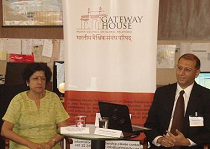
To many of us, India’s space policy and analyses around it is an unfamiliar topic. Recently, however, private sector companies are more involved in the field and are looking to participate in India’s space program in different ways. To address this development, Gateway House: Indian Council on Global Relations hosted Dinshaw Mistry, a Fellow at the Woodrow Wilson Center and an associate professor at the University of Cincinnati, to discuss with Ambassador Neelam Deo, Director, Gateway House, India’s space program and its prospects for the future.
This discussion, ranging from the history of the space program to the possible militarization of space in the future, gave a holistic understanding of India’s current space program, and its status in the world. It was argued that while India’s space program has evolved from low capability to high capability rockets and satellites, focus must now be on developing military satellites and innovation. Furthermore, the role of private companies in India’s space program was also discussed. Lastly, while most agreed that conflicts concerning space are limited, issues such as militarization and weaponization of space, and infiltration of satellites were addressed.
Dinshaw Mistry is associate professor of Political Science and Asian Studies at the University of Cincinnati. He was previously a fellow at the Belfer Center for Science and International Affairs, Harvard University, and the Center for International Security and Cooperation, Stanford University. Dinshaw Mistry specializes in international relations, security studies, technology and politics, and Asian security. He is author of Containing Missile Proliferation (University of Washington Press, 2003), a comprehensive study of the Missile Technology Control Regime (MTCR).
